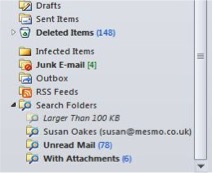How many emails do you currently have in your inbox? More than three screen’s full? That is too many and might be an indication of email overload. Your inbox should be your ‘work in progress’ folder. It is not just a general dumping ground rather like either the spare room or ‘round to it’ folder.

Inbox spring cleaning
A clean inbox is a win-win way to reduce email overload related stress because it is easier to:
Hence you can save time dealing with your (and the boss’s) inbox and therefore improve your performance and well-being. Here are five tips to help you clean up your inbox ready for the Easter break and subsequently reduce email overload on your return. They do not form a sequence, rather they are individual tips; you can of course either use them all or just choose which suit you best.

Search Folders to see all emails of specific type eg unread
If you are having time off, remember to set an Out of Office message which reduces the risk of email borne cyber crime and improves compliance to to the GDPR. And when all else fails you could always declare email bankruptcy.
Still need help with email management to reduce email overload? Call us now to ask about Mesmo Consultancy’s Smart Email Management workshops and coaching programmes.
Happy Easter.
Tags: Business Performance, Clean Inbox, Email borne cyber crime, Mesmo Consultancy, out of office message, Reduce email overload, Spring Clean Inbox, well being
Email overload remains one of the top ten drains on our productivity and well-being. Can email management training help reduce email overload and improve our well-being and mental health? We often assume that email management and best practice is instinctive. So do we really need training to reduce email overload? After all most of us use email socially so why bother to offer training at work?
A recent survey from the Association of Talent Development found that organisations who have comprehensive training programes:
Interestingly Millennials value training more than Generation X.
Many of you will have formal training programmes in place but how many of them include email management training specifically to reduce email overload? More often than not any email training consists primarily of software (eg Outlook) training. Yes, using the software properly is important. However to reduce email overload you need to look outside the email technology and instead at the email culture, the quality of employees’s email communications and the techniques they use to manage their time dealing with email and their sender’s response expectations. After attending one of Mesmo Consultancy’s Smart Email Management workshops delegates find:
Why because they no longer feel driven by their inbox, instead they have taken back control of their inbox and day. They decide when to check for new email. Good email etiquette often helps reduce the rounds of email ping-pong and means they send the right message, right first time, thus reducing the risk of an email war breaking out.
Email dominates business life. How much time are you and your colleagues wasting through lack of proper training? Click here to check? Maybe you have had some training but chances are you are only using a small percentage of the techniques covered on the course.
We all need to justify our training budgets. An average Smart Email Management workshop costs £45 per person. If you are wasting one hour a day and can reclaim even half that then training to reduce email overload pays for itself within the first day (assuming even the median hourly pay of £14.31).
Why waste any more time? If you are serious about well-being, improving mental health and productivity, grab a chunk of that training budget now for some Smart Email Management Training.
If you need some help justifying the budget call us and we can talk through how to convince the Board that providing email best practice training will improve business productivity.
Tags: email management training, email overload, Email overload and mental health, Email overload stress, Value of email management training
It takes leadership to make people do brave things. But does it take leadership to reduce email overload? Motivating them to take risks, to stand up to formidable odds, to storm an enemy fortification, to jump out of an airplane – that is where a leader can have an impact for sure. By contrast, it hardly takes leadership to make a person do something that is neither brave nor difficult, and is in the person’s selfish interest: nobody requires a leader to lead them to eat strawberry ice cream, or to enjoy a weekend with their children, or to take a pleasant nap in the warm afternoon sun. Why would they? It’s all upside, after all – what’s not to like?!

Leadership to Reduce Email Overload
So here is a bizarre exception, a situation where a great deal of leadership is necessary to make people do what is inarguably in their selfish interest. When it comes to email overload in an organization, leadership is practically a necessary condition for solving the problem.
The problem is ubiquitous and widely recognized: employees and managers in every organization on the planet suffer from a horrible overdose of incoming emails, text messages, WhatsApp alerts, Facebook updates, and so on ad nauseam. The outcomes are dire indeed, as this problem decimates people’s productivity, quality of work, creativity, effectiveness and quality of life. Everyone complains about it… yet very few seem able to do something serious to eliminate the problem on their own.
Not that it’s all that difficult: after all, email overload is the result of a frenzy of activity that is in large part unnecessary and useless. Much of the email inundating people’s inboxes is generated by their coworkers (and vice versa) for no good reason, and it would be in everyone’s interest to simply send less of it, restoring the tool to its original purpose from the 1980s: send important, useful messages required to perform the job at hand. It would also be in everyone’s interest to calm down and stop reacting to every incoming message alert as though it were a fire alarm.
And yet nobody sends less, nobody calms down, nobody cuts back. Not on their own they don’t.
The reasons for this are deep, and have to do with undercurrents of the organizational culture that involve mistrust, missing norms, over-competitiveness, and so on. Put simply, it’s a prisoner’s dilemma: if I send less email to my coworkers they will certainly benefit, but will I? What if they keep sending out more mail – will they get noticed and rewarded, while my altruism condemns me to obscurity?
And this is why in this domain, leadership is crucial. Consider the prisoner’s dilemma again: the only way to make people cooperate in this game is by changing the payoff table. If cooperation – sending less email – is rewarded, then people will send less of it. If sending silly pictures of cats to a large distribution list will get you a reprimand in your annual performance review, you will find better use for your time, and your recipients’. But only the group’s manager, who sits in the hierarchy above all the senders, can effect such a change in payoffs. Employees are very finely attuned to sense their boss’s desires, and if the boss makes the switch and truly believes in an email reduction program, they will react instantly.
Furthermore, the higher that boss in the organization, the wider the scope of his or her impact. A department manager can affect the mailing behavior within the department, but other departments will continue unaffected, impacting the first manager’s employees too. For a complete improvement, the general manger or CEO must be on board; that affects everybody inside the company. This is why the late W. Edwards Deming, the originator of Total Quality Management, used to refuse to consult at a corporation unless the CEO invited him in person; he knew that the culture change he was promoting would be certain to fail without top level leadership.
Once we accept that email overload is a cultural problem, it follows that you want to have senior management sponsorship for the solution program. You can still do a lot without it – teaching people how to process their inbox more efficiently, for one thing – but for a true transformation you want to recruit managers as high up as you can. Not an easy task, but well worth the effort!
Nathan Zeldes is a globally recognized thought leader in the search for improved knowledge worker productivity. After a 26 year career as a manager and principal engineer at Intel Corporation, he now helps organizations solve core problems at the intersection of information technology and human behavior.
Tags: email culture, Leadership and email overload, Reducing business email overload
Badly managed email is the “number one drain” on many businesses’ productivity, it has been claimed.

Email overload and stress
Despite the rise of other ways to send messages, email traffic is predicted to grow by four per cent a year worldwide and 296 billion are sent each day. An inbox declutter is one sure fire way to improve your performance, well being and mental health. Click here for more.
This article first appeared in the Bournemouth Echo on 25 January 2019.
Tags: Bournemouth Echo, Business email overload, Declutter, Email overload and business performance, Stress and email overload
 Studies over the past decade, link the rise in musculoskeletal disease to the increased time we spend working at our computers. In 2013 it was estimated that in the UK businesses lost about 30 million days through musculoskeletal related illness such as chronic back, lower limb, wrist and hand problems.
Studies over the past decade, link the rise in musculoskeletal disease to the increased time we spend working at our computers. In 2013 it was estimated that in the UK businesses lost about 30 million days through musculoskeletal related illness such as chronic back, lower limb, wrist and hand problems.
Improve your performance by keeping your whole body energised
Here are ten top tips drawn from talking to a range of medical and related experts (such as physiotherapists, orthopaedic specialists and ophthalmic consultants) to keep you at peek performance and ultimately save time whilst dealing with email (and indeed any technology related task). Click here to read more.
This article first appeared in Executive Secretary Magazine, a global training publication and must read for any administrative professional. You can get a 30% discount on an individual subscription when you subscribe through us. Email subscriptions@executivesecretary.com and tell them we sent you.
Tags: Business email overload, Business Performance, Musculoskeletal disease, well being